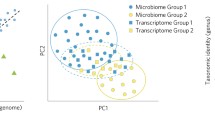Abstract
Lynch et al. (Biol Philos, 2019) propose an extremely useful framework to assess microbiome research. By utilising advances in the causation literature, they argue that many of the claims in microbiome research are ‘weak or misleading’ as these claims lack stability, specificity, or proportionality. In the final paragraph before the conclusion they entertain and rapidly dismiss the ‘ecological version’ of microbiomes, in which microbiome properties are emergent from their constituent populations and can fulfil Koch’s postulates. I assess the possibility of microbiomes having emergent causal efficacy on host health and suggest they can.
Similar content being viewed by others
References
Doak DF, Bigger D, Harding EK, Marvier MA, O’malley RE, Thomson D (1998) The statistical inevitability of stability-diversity relationships in community ecology. Am Nat 151(3):264–276
Ereshefsky M, Pedroso M (2013) Biological individuality: the case of biofilms. Biol Philos 28(2):331–349
Fischbach MA, Sonnenburg JL (2011) Eating for two: how metabolism establishes interspecies interactions in the gut. Cell Host Microbe 10(4):336–347
Flint HJ, Scott KP, Duncan SH, Louis P, Forano E (2012) Microbial degradation of complex carbohydrates in the gut. Gut Microbes 3(4):289–306
Lean CH (2018) Indexically structured ecological communities. Philos Sci 85(3):501–522
Liu L, Chen X, Skogerbø G, Zhang P, Chen R, He S, Huang D-W (2012) The human microbiome: a hot spot of microbial horizontal gene transfer. Genomics 100(5):265–270
Lynch KE, Parke EC, O’Malley MA (2019) How causal are microbiomes? A comparison with the Helicobacter pylori explanation of ulcers. Biol Philos
Matias M, Combe M, Barbera C, Mouquet N (2013) Ecological strategies shape the insurance potential of biodiversity. Front Microbiol 3:432
Morris JJ, Lenski RE, Zinser ER (2012) The Black Queen Hypothesis: evolution of dependencies through adaptive gene loss. MBio 3(2):e00036-12
Scheuring I, Yu DW (2012) How to assemble a beneficial microbiome in three easy steps. Ecol Lett 15(11):1300–1307
Sterelny K (2005) The elusive synthesis. In: Cuddington K, Beisner B (eds) Ecological paradigms lost: routes of theory change, vol 2. Elsevier, Amsterdam, pp 311–329
Tilman D, Downing JA (1994) Biodiversity and stability in grasslands. Nature 367(6461):363
Acknowledgements
I would like to thank Derek Skillings for a helpful discussion on the response. Work on this paper was supported by an Australian Research Council Discovery Grant (Grant Number DP170104924).
Author information
Authors and Affiliations
Corresponding author
Additional information
Publisher's Note
Springer Nature remains neutral with regard to jurisdictional claims in published maps and institutional affiliations.
This comment refers to the article available at https://doi.org/10.1007/s10539-019-9702-2.
Rights and permissions
About this article
Cite this article
Lean, C.H. Can communities cause?. Biol Philos 34, 59 (2019). https://doi.org/10.1007/s10539-019-9715-x
Received:
Accepted:
Published:
DOI: https://doi.org/10.1007/s10539-019-9715-x



